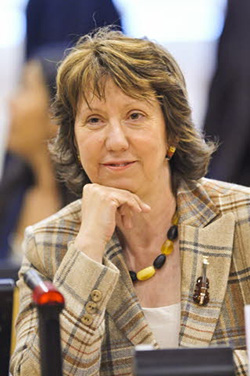How Russian journalists became a hostage of Putin’s foreign policy
“I don’t wanna talk to you” – these were the words from a famous British politician lady Catherin Ashton, directed to me that stopped me in my tracks.
What was that? I referred my bewilderment to my friend who had witnessed our short conversation.
“Don’t take it personally, she is always incredibly rude,” said Bob Arsenault, a CEO of International consulting company with close ties to Russia.
Ashton’s strange behavior became one of the most discussed topics on the sidelines of the Global World Order conference in Philadelphia.
“Put away your camera, I am talking to you, not to your phone,” Ashton responded to my question about Russian-European Union relations.
The question obviously wasn’t the problem for her, but rather, it was my status as a Russian and a journalist that formed a combination that seemed almost untenable for Ashton.
“If she behaves like while being a High Representative of the Union for Foreign Affairs and Security, it’s not surprising that Russia’s relations with the EU are at nearly zero,” I joked.
Looking back I’m not sure why I joked, it wasn’t funny, she made me feel singled out, unwelcomed and extremely uncomfortable throughout the entire event, one I had very much looked forward to.
As a liberal minded individual and a advocate for Russia’s convergence with the European Union, it was especially offensive to hear such remarks. However, during her tenure as an EU policy representative Russo-European relations have almost disintegrated entirely.
Her career has been marred by many a controversy, in 2012 Ashton sparked scandal when she refused Russian journalists access to a press-conference.
Prior to meeting Ashton I would have assumed that measures and strategies such as this were only tactics in the information war, initiated by Kremlin. I now realize that press suppression is not simply a tactic of information censorship but also a blatant display of unprofessionalism, practiced by many a politician.
I wish Ashton no ill will, but I can’t help but personally feel that she has proven herself to be a – washed up politician with an almost nonexistent level of influence.
Although, she is not the only example, numerous politicians are responsible for diplomatic relations, one would have expected more. If a surgeon is rude, but still saves people’s lives on a daily basis, at least he is still doing his job to better society. However when a public figure, responsible for an international contacts, fails to fulfil their responsibilities and behaves extremely rudely while doing so, that is a severe problem.
What was once merely a problem of diplomacy became a personal issue for me when she made it her mission to attempt to suppress the voices and access of journalist.
Where the EU always represented the side of morality, the side willing to fight for the rights of people and journalists alike, and the Kremlin the supposed enemy ; in the matter of a single act Ashton managed to blur this line making the EU’s role in the war for good hazy.
The line – the one separating the a-moral from the moral – has existed as a border between Russia and the West. It has only been through my travels, first to Europe then to the United Stated that I have experienced the true privilege of a free press.
There are clear moments to which I can refer, moments where journalism in Russia was brought under attack. The line was crossed on March, 2014 when Russia annexed Crimean peninsula; European Union and the U.S. imposed sanctions on Russia.
In retaliation the Kremlin ordered major Russian state-owned-media outlets to start an information war against the West.
The heaviest propaganda launched by Kremlin reminded some analysts the propaganda machine of Nazi’s in Germany of 1930s.
Although the German people, as a nation, have never been penalized for their role in the Second World War, Russian journalists and the Russian people – whatever their political background – are now facing the consequences of Vladimir Putin’s actions on the world’s stage.
The dawn of misinformation hit me when I attended a press trip to the USA organized by the U.S. Department of State. It was two weeks prior the presidential elections of 2016. No one believed Trump could win, Russian investigation was in progress. Never has a member of the Democratic party accepted invitation to meet with a group of strictly Russian journalists, the official reason has never been announced, but it was later discovered that the American democrats simply don’t want to meet with Russian journalists.
Being a Humphrey fellow at Arizona State University and studying a journalism in the U.S., it has been difficult for me to arrange interviews with politicians. My Russian background has never been a hindrance or trait by which I have been biased against, but I always feel that I’m not just a journalist, I am “a journalist from Russia” – a spy.
That’s makes the things different for me, and the attitude of any American officials is different.
Do I feel as a victim? No. What I feel instead, is that I am part of an ongoing fight for equality, fight for democracy, fight against discrimination. During my time in Philadelphia, vice-president Joe Biden’s words became more important for me, than all the hatred of Catherin Ashton.
“America is not a country, it’s an idea that attracts people from all over the world.” said Biden. “That unique opportunity means we can cherry-pick from among the best of the best”.
Biden was pretty precise, and so too will I try, because it’s not important, where you come from, what matters is where are you going.


Wow Alex this is so interesting, I am sorry to hear that you have faced political bias, that is something no one should have to go through.